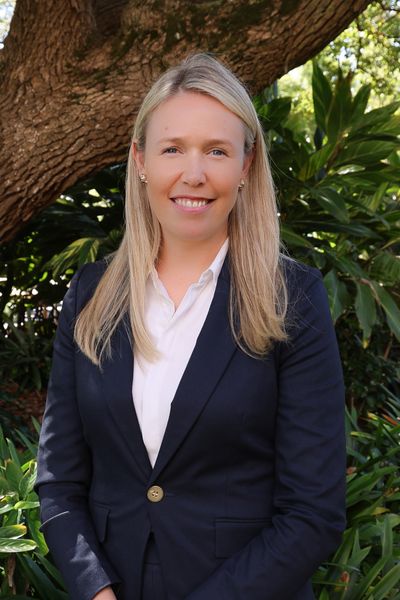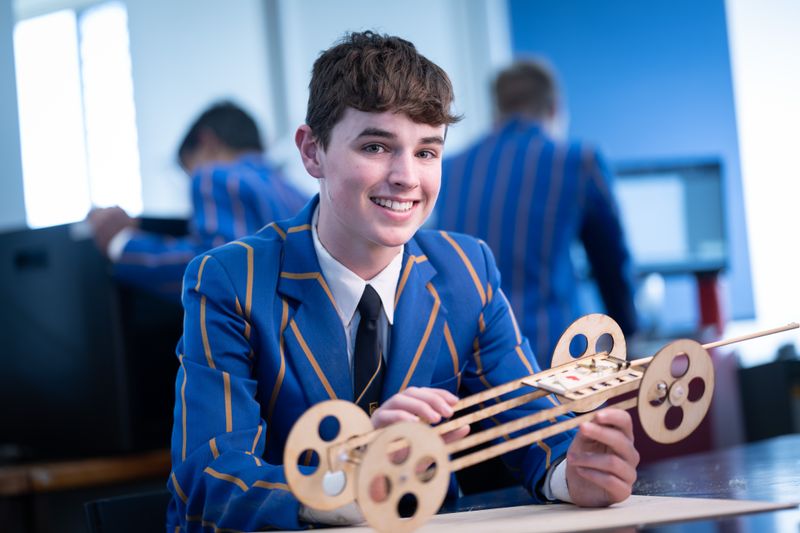“The reality is that every single job can expect to change in some respect in the immediate and long-term future.”— Mrs Crystal Hede

In education, some things will never change. Students will thrive in environments that nurture human connections.
They will invariably be inspired by effective teaching and the satisfaction of personal achievement will always be motivating. At Toowoomba Grammar School, the power of high-quality instructional practices has resulted in the development of a strong academic culture that has endured for nearly 150 years. Preserving core principles provides stability and continuity. However, we must be open to continuously adapting our methods so that our students are well-prepared for the ever-changing world they will navigate. As put by CSIRO CEO, Dr Larry Marshall, “Australia is at a pivotal point. There is a tidal wave of disruption on the way, and it’s critical we take steps now to get ahead of it” (CSIRO, 2022).
Several megatrends identified by the CSIRO are set to shape future society. Technological advancement, particularly the rise of machine learning and the Internet of Things (IoT), will drive augmented and autonomous intelligence across many industries and blur the lines between physical and digital. A global focus on environmental sustainability is predicted to drive industrial change. Global geopolitical shifts will occur for stability and economic growth. Lastly, demographic change, particularly an ageing and more urbanised population, will create new needs. In relation to demographic change, Jobs and Skills Australia projects that across all industries, the greatest growth is expected in health care and social assistance, with its share of total employment reaching 16.7% by 2033 (Jobs and Skills Australia, n.d.).
These megatrends will have far-reaching implications for the workforce. According to the World Economic Forum (2023), 44% of workers’ core skills are expected to change by 2027. Incredibly, the Business Council of Australia estimates that 5–10% of jobs could be entirely substituted by technology over the next decade. Technological change will also generate jobs. The field of robotics, for example, has seen a sudden demand for automation specialists, robotics law specialists, robotics ethicists, trainers, educators and job re-design specialists tasked with developing new roles and skill sets for jobs with increased automation (International Federation of Robotics, 2024). It is important to consider that the above-mentioned jobs will be industry-agnostic and relevant to agriculture, sport, finance, retail trade and more.
Looking forward allows us to reflect on the gap that exists between where our students are now and where they will need to be. In his 2019 book Teaching for Tomorrow, renowned futurist and educator Michael McQueen identifies four capabilities that will be critical for individuals to succeed and thrive in future society. At TGS, we are aware of these projected “capability gaps” and are taking steps to address them in the following ways.

First, we know that students will require self-direction to cope with rapid technological and job change, especially in a booming gig economy. As such, we are positioning our students as lifelong knowledge seekers who can adapt their skill sets to stay ahead.
Second, we know that an increasingly competitive job market and pressure to continually master new skills will require tenacity. Consequently, we continually look to create opportunities for our students to deal with perceived failure and develop grit, resilience and optimism in the process. Third, we understand that the rise of artificial intelligence will result in competing organisations having access to the same information. Originality and creativity will, therefore, become highly sought-after skills, further solidifying their importance in our educational program. Lastly, a world of automation and information abundance will require individuals who can think ethically and with acuity. That is, to discern truth and identify biases. The TGS curriculum continues to place value on this higher-level thinking.
We know that developing all these skills requires a broad knowledge base, and this underpins our pedagogical approach of Explicit Direct Instruction within a knowledge-rich curriculum. Giving our boys deep and relevant background knowledge will develop their acuity to solve complex problems and to think critically and creatively in the future (AERO, 2024). Parents can be assured that we are building an educational program that is suitably responsive to future needs.
Additionally, we continue to explore ways of developing our students’ technological capacity. Our forthcoming Design, Engineering and Technology Centre exemplifies our commitment to this cause. Boys will gain further opportunities to automate workflows, use cloud-based solutions and engineer prototypes, for example. From virtual reality to robotics labs, there will be boundless potential for innovation, not to mention the opportunities that the Agriculture and Industry Centre will also offer. Importantly, these planned spaces will connect our boys with industry and the broader community to foster authentic learning.
In partnership with parents, we can equip TGS boys with the skills and dispositions needed to thrive in this ever-evolving world.

References
Australian Education Research Organisation. (2024, March). A knowledge-rich approach to curriculum design. Australian Education Research Organisation. https://www.edresearch.edu.au/sites/default/files/2024-02/knowledge-rich-approach-curriculum-design-aa.pdf
CSIRO. (2022). Our Future World. CSIRO. Retrieved May 05, 2024, from https://www.csiro.au/en/research/technology-space/data/our-future-world
Jobs and Skills Australia. (n.d.). Employment projections for the decade ahead. Jobs and Skills Australia. Retrieved May 01, 2024, from https://www.jobsandskills.gov.au/publications/towards-national-jobs-and-skills-roadmap-summary/employment-projections-for-the-decade-ahead
McQueen, M. (2019). Teaching for Tomorrow: A Blueprint for Future-Proofing Our Schools, Students and Educational System. The Nexgen Group Pty Ltd.
The World Economic Forum. (2023, May 1). Future of jobs: These are the most in-demand skills in 2023 - and beyond. The World Economic Forum. Retrieved May 02, 2024, from https://www.weforum.org/agenda/2023/05/future-of-jobs-2023-skills/
Latest Blog
The Silent Epidemic: Unveiling the Consequences of Sleep Deprivation
“Sleep that soothes away all our worries. Sleep that puts each day to rest. Sleep that relieves the weary laborer and heals hurt minds.” William Shakespeare (Macbeth, 1606) Heart Disease, Cancer, and Alzheimer's. Three life-threatening diseases. Three diseases all linked to lack of sleep. According to Dr. Okorie from the children’s health division of Stanford University, “7 out of 10 high school students are falling short of… (sleep) on school nights.” The Bulk of American teens are not getting…
Tik Tok - From Fun to Fear
Social media platforms have ingrained themselves into our daily lives in a time when technology is constantly evolving and drawing millions of users with seductive features and never-ending streams of captivating content. Among these, TikTok has become a worldwide phenomenon, captivating users with its viral challenges and short-form films. Underneath the fun and inventiveness however, there is growing concern about the risks connected to TikTok and other social media platforms. TikTok's…
Active Procrastination – Unlocking the Gates of Time
“Procrastination is like a credit card: it’s a lot of fun until you get the bill.” - Christopher Parker – professional actor. Unfortunately, procrastination is a term that we are all familiar with as students; the vast majority of us have experienced it firsthand. It saps our time and results like a parasite, a burden on its host. However, despite it’s reputation, recent studies have shown that when harnessed correctly, procrastination can be a powerful tool to improve both academic efficiency…
It Takes a Village...
The Toowoomba Grammar School Boarding community plays a pivotal role in shaping the young minds of our boarders and instilling values whilst creating a sense of mateship that can last a lifetime. The nurturing and supportive network of staff not only ensure a safe and structured environment but also cultivates a sense of belonging and camaraderie among the boys. ‘The staff supply the fuel to the ship but ultimately it is the boys who steer it and decide upon its final destination’. Our TGS…
Unlocking Literacy - The Big Six Elements for Your Child’s Reading Success
Literacy skills are a core component of each day for our students, and parents often ask how they can support this from home. I am delighted to share with our parent community the essential components that underpin successful reading development. These elements, known as the Big Six, provide a solid foundation for your son’s literacy journey. These critical building blocks include: Oral Language: Communication skills are the bedrock of reading. Encourage rich conversations with your child.…
The Journey of a Boarding Mother
When you look up mother in the dictionary it reads: female parent of a child. When you look up boarder, it simply reads: a child who lives away from home. So, put “boarder mother” together and we have: the female parent of a child who lives away from home – if only it were that simple. My definition of boarding mother is: a strong, dedicated unbelievably great female parent of a child who has the wisdom to put her son’s educational needs, wellbeing and lifelong endeavours before her own. A…
The Importance of Differentiation
As parents, we all want our children to have the best possible education, and one of the most effective ways for teachers to provide this is through differentiation. Differentiation means tailoring instruction to meet the unique needs and interests of each student, and it can take many forms. First, let's define differentiation. Differentiation is a teaching approach that recognises that students have different strengths, interests, and learning styles. By adjusting instruction to meet these…
Addressing Anger in Teenage Boys
As a community dedicated to the growth and well-being of our teenage boys, it is essential to address the complexities of emotions we experience during adolescence. Among these emotions, anger stands out as a powerful and intense feeling that can influence their behaviour, relationships and overall wellbeing. Untreated anger can lead to a myriad of problems and challenges for our young boys. In this comprehensive guide, we will explore the dangers of untreated anger, ways to support healthy…
Study Skills Program
Just as teachers benefit from an understanding of the Learning Sciences in their lesson planning and preparation, so to do students when they are studying for major summative assessments. A survey of TGS students in Years 9 to 12 found that 70% of our boys felt that they knew how to study, with the biggest impediments to study being lack of motivation and too many distractions. The most highly preferred study technique was found to be rewriting notes. Cramming, rereading the text and rewriting…